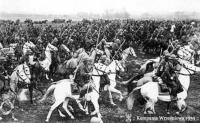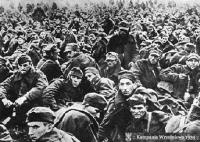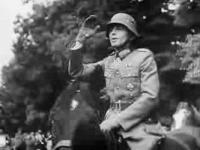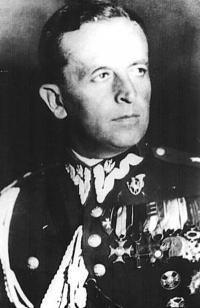
Polish cavalry preparing to attack.

Polish POWs

German Major-Gen. Kurt von Briesen saluting his troops as they pass in review in Paris.

Polish Gen. Stanislaw Grzot-Skotnicki
This week, seventy years ago, the Polish Armia Poznan, commanded by Major-General Tadeusz Kutrzeba, attacked the invading German Eighth Army commanded by Johannes Blaskowitz, in what would be the largest battle during the Polish campaign, in the opening phase of the Battle of the Bzura River, located west of Warsaw. General Kutrzeba had served in the Austro-Hungarian Army during the Great War. His Army consisted of four infantry divisions, the Fourteenth, Seventeenth, the Twenty-fifth and Twenty-sixth, and two cavalry brigades, the Wielkopolska, commanded by General Roman Abraham and the Podolska, commanded by Colonel Leon Strzelecki. The opposing commanders were both career army officers and veterans of the Great War.
As the German Eighth Army headed for Warsaw, General Kutrzeba noticed that its left flank was weak. On September 9th he launched his two cavalry brigades against the over-stretched German Thirtieth Infantry Division. Although suffering 4500 casualties in desperate fighting, the Thirtieth Infantry Division managed to halt the Polish advance. Its Commander, Major-General Kurt von Briesen, personally led his last reserve battalion in a counterattack which halted the Poles, but cost him a serious wound to his arm. Der Führer later said, to General Wilhelm Keitel, that,
“That is a real Prussian General of the Royal School. You can’t have enough soldiers like him. He is a man after my own heart. Before today is over I want him to be the first Divisional Commander to get the Knight’s Cross. He has saved Blaskowitz’s Army by his gallantry and drive.”
Hitler personally awarded him the Knight’s Cross of the Iron Cross (Ritterkreuz), in the hospital, for his gallantry. But the Germans had been thrown back approximately twenty kilometers south of their original positions, and the Poles recaptured several towns.
More heavy fighting occurred on the next day when the Polish Seventeenth Infantry Division, commanded by Colonel Mieczyslaw Mozdyniewicz, encountered the German Seventeenth Infantry Division, commanded by General Herbert Loch, at Malachowicze. However, with the Luftwaffe commanding the skies, the Poles had tough sledding.
After learning, on September the 12th, that Armia Lodz, on the left flank of Armia Posnan, had disintegrated, with part retreating into the Modlin Fortress and that the rest - about 30,000 - under its Commander, General Juliusz Rommel, making their way to Warsaw, on September 15th and 16th, Armia Pomorze, under the command of General Wladyslaw Bortnowski, took up defensive positions on the northern bank of the Bzura River, and linked up with Armia Posnan. During The Great War General Rómmel had served the Austro-Hungarian Empire, while General Bortnowski served its enemy, the Russian Empire. Both spent the next 4.5 years in German P.O.W. camps. After the war General Rómmel returned to Poland and died in Warsaw in 1967. General Bortnowski eventually emigrated to the United States and died in Doylestown, Pennsylvania, in 1966.
The German Tenth Army, under the command of General Walter von Reichnau, together with elements of the Fourth Army, commanded by General Günther von Kluge, on September 16th, linked up with the Eighth Army and surrounded and attacked both Polish Armies. Although neither German commander would survive the war, both earned the coveted Field Marshal’s baton. Field Marshal von Reichnau died of natural causes in winter of 1942. Field Marshal von Kluge died by his own hand in July 1944. General von Briesen was killed on the Eastern Front in 1941. His division had the honor of marching through the Arc de Triumph in Paris, 10 months later.
On the night of September 17th, Armia Posnan/Pomorze attempted a break out, with some heading for Warsaw, and some heading for Modlin Fortress. Generals Kutrzeba, Edmund Stansislov Knoll-Kownacki and Michal Tadeusz Karaszewicz-Tokarzewski, together with the two cavalry brigades and the Fifteenth and Twenty-Fifth Infantry Divisions, commanded by Generals Zdzilaw Przyjalkowski and Franciszek Alter were able to make it out. The rest - 170,000 - under General Bortnowski, surrendered between the 18th and 22nd of September. The 20,000 Polish dead included Generals Franciszek Wlad, Stanislaw Grzmot-Skotnicki, and Mikolaj Boltuc. German dead numbered 8,000.
Although the Poles were defeated, the German advance towards Warsaw, and its timetable, had been slowed, giving the City time to better organize its defenses.
In speaking of the battle, years later, Hitler said that this, “...battle cost me more nerves than the whole French Campaign!”
Mr. Wimbrow writes from Ocean City, Maryland, where he practices law representing those persons accused of criminal and traffic offenses, and those persons who have suffered a personal injury through no fault of their own.
«Go back to the previous page.



